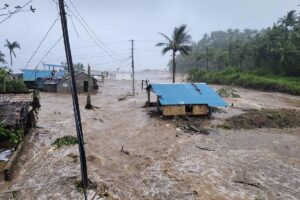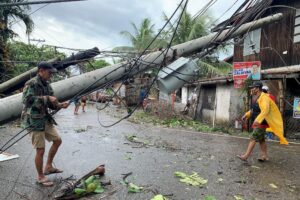The Office of Civil Defense (OCD) Administrator Undersecretary Ariel F. Nepomuceno recently engaged in a strategic dialogue with Swedish Ambassador Anna Ferry, Philippine Disaster Resilience Foundation (PDRF) Resilience Officer Guillermo Luz, and World Food Programme Country Director Regis Chapman. The meeting focused on enhancing systematic disaster risk management and strengthening community resilience across the Philippines.
Initiated by Ambassador Ferry during a breakfast gathering, Nepomuceno emphasized the importance of adopting strategic and systematic approaches to disaster risk reduction, as well as implementing measures to minimize community vulnerabilities to disasters. He discussed the structure of the National Disaster Risk Reduction and Management Council (NDRRMC), which operates through four core clusters: disaster prevention and mitigation, managed by the Department of Science and Technology (DOST); disaster preparedness, overseen by the Department of the Interior and Local Government (DILG); disaster response, supervised by the Department of Social Welfare and Development (DSWD); and rehabilitation and recovery, handled by the Department of Economy, Planning, and Development (DEPDEV).
Nepomuceno highlighted the OCD’s vital role as the NDRRMC secretariat, ensuring smooth coordination and filling operational gaps. “The OCD’s primary responsibility is to eliminate hurdles and address gaps to ensure effective disaster response,” he stated.
He detailed the government’s ongoing efforts to strengthen disaster monitoring and response capabilities, particularly through building collective memory and organizational resilience from the barangay level to the national level. Nepomuceno also stressed the importance of leveraging advanced technology in disaster preparedness and response. “We utilize several scientific tools from DOST, such as PlanSmart Ready-to-Rebuild for recovery planning, and geohazard.ph and hazardhunter.ph — platforms where communities can assess the safety of their homes or resorts by simply inputting their addresses,” he explained.
Furthermore, Nepomuceno underscored the importance of international and private sector partnerships to bolster disaster resilience. “We are actively engaging the private sector, both locally and internationally, to develop resilient infrastructure and promote climate adaptation,” he said. To facilitate these collaborations, the OCD has established a new office dedicated to local and international engagement.
He expressed gratitude for Sweden’s support, particularly through the Swedish Civil Contingencies Agency’s International Training Program (ITP) on Disaster Risk Management. “Many of our personnel who underwent your ITP are now leading initiatives that integrate innovation, local resilience, and risk-informed planning across the Philippines,” Nepomuceno noted.
Nepomuceno also acknowledged the invaluable partnership with PDRF, composed of the country’s leading conglomerates, and ARISE Philippines, a coalition of over 150 private sector entities. “Their unwavering support enhances our capacity to prepare, respond, and implement long-term disaster mitigation strategies,” he said.
Finally, Nepomuceno emphasized that these partnerships serve not only the OCD but the entire government, helping to move forward with a whole-of-society approach to disaster resilience. With continued collaboration, the Philippines is working toward a safer, more prepared future.



